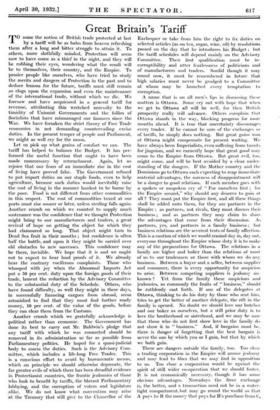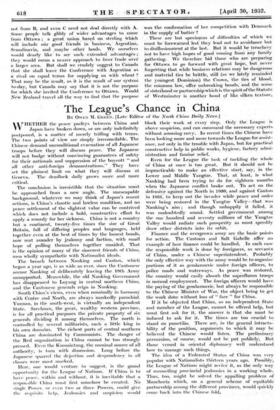Great Britain's Tariff
TO some the notion of British trade protected at last by a tariff will be as balm from heaven refreshing them after a long and bitter struggle to attain it. To others, more slothfully minded, Protection will seem now to have come as a thief in the night, and they will be rubbing their eyes, wondering what the result will be to themselves, their country, and the Empire. To prosier people like ourselves, who have tried to study the merits and dangers of Protection in the past and to deduce lessons for the future, tariffs must still remain as clogs upon the expansion and even the maintenance Of the international trade, without which we die. We foresaw and have acquiesced in a general tariff for revenue, attributing this wretched necessity to the timidity of Unionist Governments and the follies of Socialists that have mismanaged our finances since the War. We have forsaken the strict theory of Free Trade economics in not demanding countervailing excise duties. In the present temper of people and Parliament, we might as well cry for the moon.
Let us pick up what grains of comfort we can. The tariff has helped to balance the Midget. It has per- formed the useful function that ought to have been made unnecessary by retrenchment. Again, let us rejoice that our fears of an immediate rise in the cost of living have proVed false. The Government refused to put iniport &ties on our staple foods, even to help agriculture, because such duties would inevitably raise the cost of living in the manner hardest to be borne by the poor. Food is not different from other commodities in this respect. The cost of commodities taxed at our ports must rise sooner or later, unless sterling falls again. Another crumb on which we counted to supply much sustenance was the confidence that we thought Protection might bring to our manufacturers and traders, a great revival of hope on getting the object for which they had clamoured so long. That object might turn to Dead Sea fruit in their mouths ; but confidence is often half the battle, and upon it they might be carried over old obstacles to new successes. This confidence may be there, invisible. We hope that it is and we ought not to expect to hear loud proofs of it. We already hear the—contrary vociferous complaints. Those who Whooped with joy when the Abnormal Imports Act put a 50 per cent. duty upon the foreign goods of their trade, lament the reduction by the Advisory Committee to the Siffistantial duty of the Schedule. Others, who have found difficulty, as well they might in these days, in successfully financing cargoes from abroad, seem astonished to find that they most find further ready money, 10 per cent. of the value of the goods, before they can clear them from the Customs.
Another crumb which we gratefully acknowledge is political rather than economic. The Government has done its best to carry out Mr. Baldwin's pledge that any tariff with which he was connected should be removed in its adininistration so Tar as possible from Parliainentary polities. He hoped for a quasi-judicial body to assess the duties. Such is the Advisory Com- mittee, which includes a life-long Free Trader. This is a conscious effort to avoid by bureaucratic means, which on principle we should otherwise deprecate, the fai greater evils of which there has been dreadful evidence in Protectionist countries, the frantic jealousies of those who look to benefit by tariffs, the blatant Parliamentary lobbying, and the corruption of voters and legislators .alike. We do not know what convention may arise at the Treasury that Will give to the Chancellor of the Exchequer or take from him the right to fix duties on selected articles (as on tea, sugar, wine, oil) by resolutions passed on the day that he introduces his Budget ; but the tariff schedules will depend mainly on the Advisory Committee. Their first qualification must be in- corruptibility and utter fearlessness of politicians and of manufacturers and traders. Sordid though it may sound now, it must be remembered in future that high salaries must never be grudged to a Committee at whom may be launched every temptation to corruption.
A name that is on all men's lips iu discussing these matters is Ottawa. -Some cry out with hope that when we get to Ottawa all will be well, for then British prosperity really will advance. Others complain that Ottawa stands in the way, blocking progress for more months ahead. It is true that uncertainty discourages every trader. If he cannot be sure of the exchanges or of tariffs, he simply does nothing. But great gains won at Ottawa might compensate for present waiting. We have always been Imperialists, even suffering from taunts for jingoism, and we earnestly hope that great good may come to the Empire from Ottawa. But great evil, too, might come, and will be best avoided by a clear under- standing of the dangers. If the Mother country and the Dominions go to Ottawa each expecting to reap immediate material advantages, the soreness of disappointment will be a danger to good relations. If each member goes with a spoken or unspoken cry of " For Ourselves first ; for the Empire second," why should any deserve to gain at all ? They must put the Empire first, and all these things shall be added unto them, for they are partners in the Empire ; as partners, not rivals, they must discuss their business ; and as partners they may claim to share the advantages that conic from their discussion. A. partners, yes, and partners in a family business ; but business relations are the severest tests of family affection. This is a caution of which we would remind day in, day out, everyone throughout the Empire whose duty it is to make any of the preparations for Ottawa. The relations- in a family are higher and holier than the relations of most of us to our tradesmen or those with whom we do any business. Between a buyer and a seller, between supplier and consumer, there is every opportunity for suspicion to arise. Between competing suppliers is jealousy un- known ? Yet from the family these suspicions and jealousies, so commonly the fruits of ," business," should be ruthlessly cast forth. If one of the delegates at Ottawa, thinking to do his duty by those who sent him, tries to get the better of another delegate, the rift in the family is opened. No doubt we should love our butcher and our baker as ourselves, but a still prior duty is to love the brotherhood or sisterhood, and we may be sure that those who do not first show love in the family do not show it in " business." And, if bargains must be, there is danger of forgetting that the best bargain is never the one by which you or I gain, but that by which we both gain.
There are dangers outside the family, too. Too close a trading corporation in the Empire will arouse jealousy and may lead to blocs that we may find in opposition to us. Too close a corporation would be against the spirit of still wider co-operation that we -should foster. It is not economically necessary, though it has some obvious advantages. Nowadays the freer exchange is, the better, and a transaction need not be in a water- tight compartment, but may go round the world so that A pays to B the money that pays for B's purchase from C, not from B, and even C need not deal directly with A. Some people talk glibly of wider advantages to come from Ottawa ; a great union band on .sterling which will include onr good friends in busineas, • Argentina,' Scandinavia, and maybe other lands. We ourselves would dearly like to See such extended advantages ;. they would mean a nearer 'approach to freer trade Ov' A larger area. But shall we crudely suggest to Canada that she shall. leave the Conference with Argentina as a rival on equal terms for supplying us with wheat ?. That may be the result, as it is the result of our system to-day, but 'Canada may say that it is not the purpose for which she invited the Conference to Ottawa. Would NfW Zealand-travel all the way to find that the purpose
was the confirmation of her competition with Denmark in the atrpirly of hutter ?
' These are but spechnens of difficulties of which wb 'must be forewarned les(' they lead not to avoidance but to disillusionment at the last. But it would be treachery not to have high hopes of good coming fromany family gathering. We therefore bid those who are preparing for Ottawa_ to go forward with great hope, but never forgetting that while business relations may be dangerous and Material ties be brittle, still (as we lately reminded the youngest Dominion) the Crown, the ties of blood, the conimon law, offer uribieakitig bonds; and the sense of sisteihood or partnership which is the spirit of the Statute of Westininster is another bond of like silken texture.







































 Previous page
Previous page